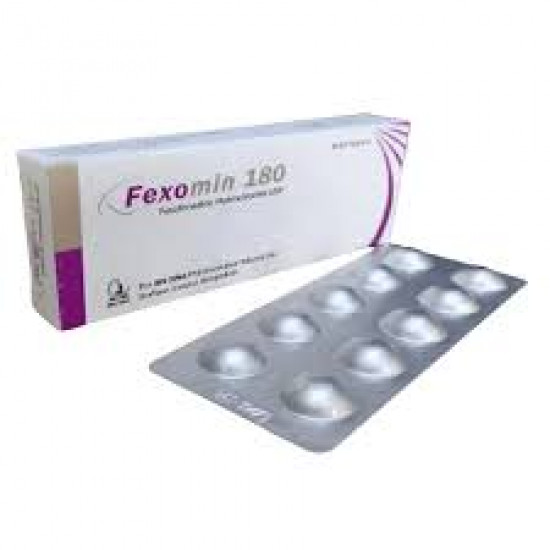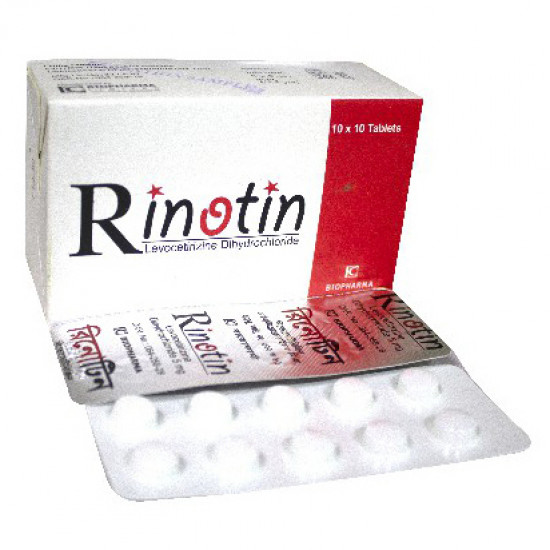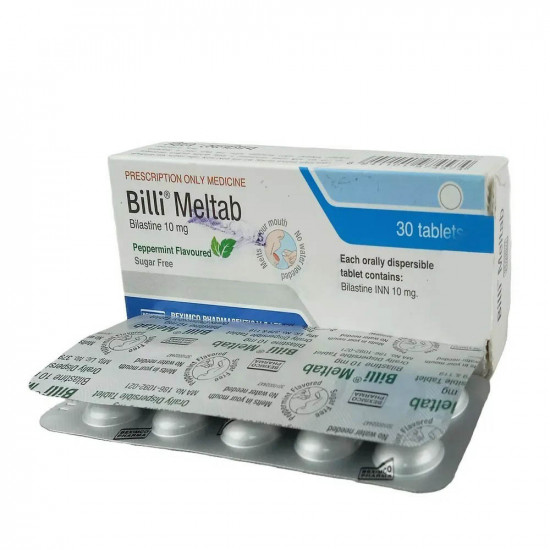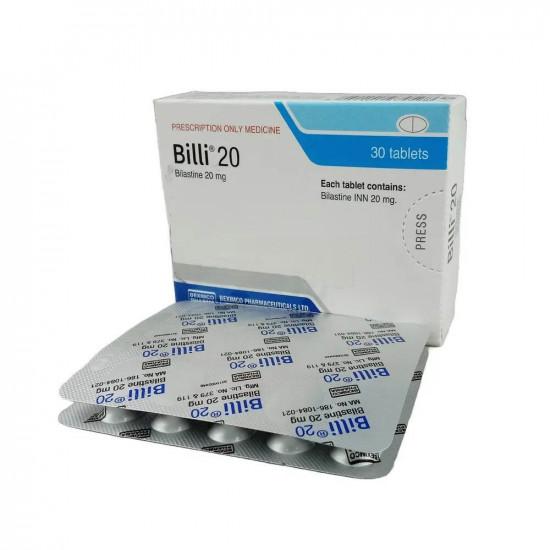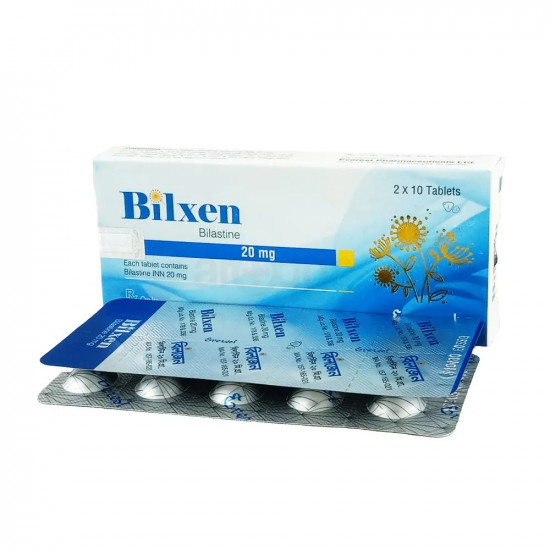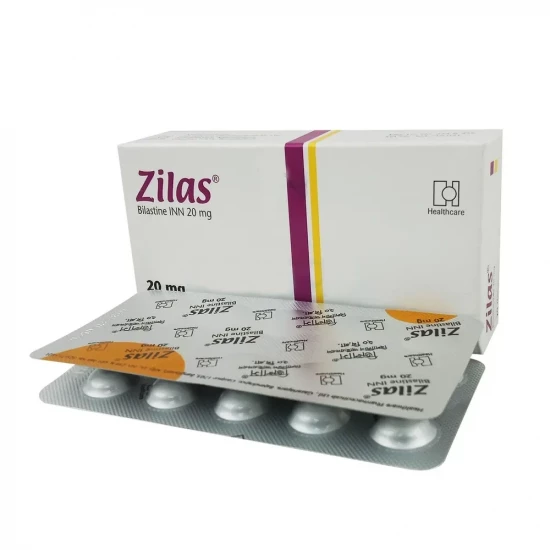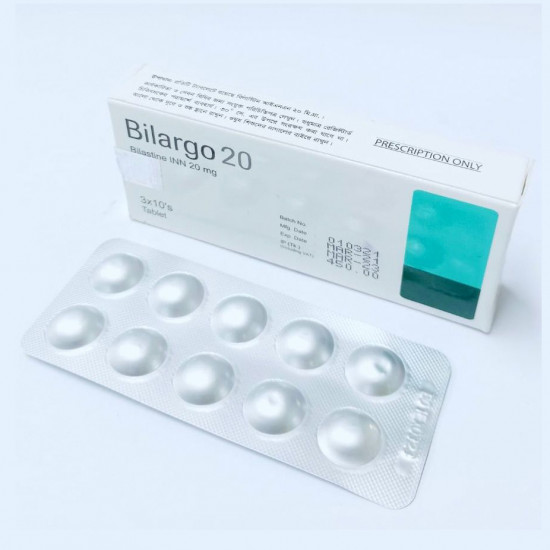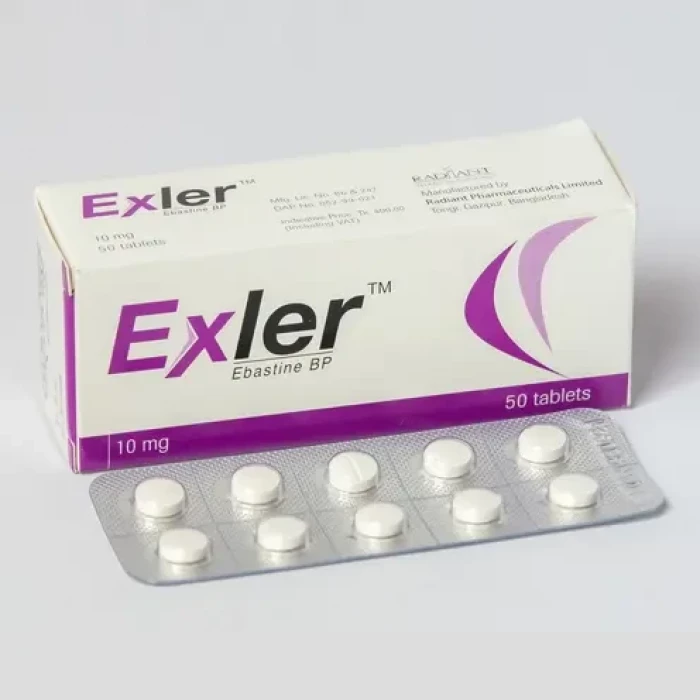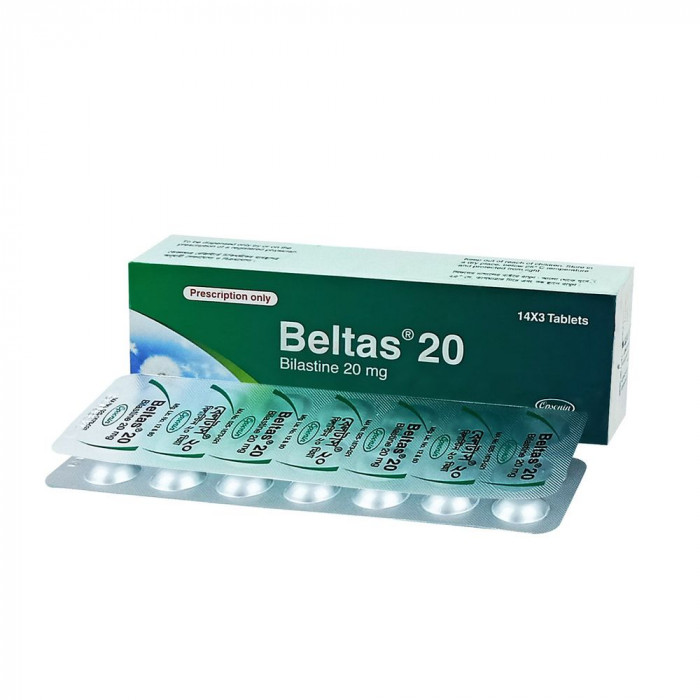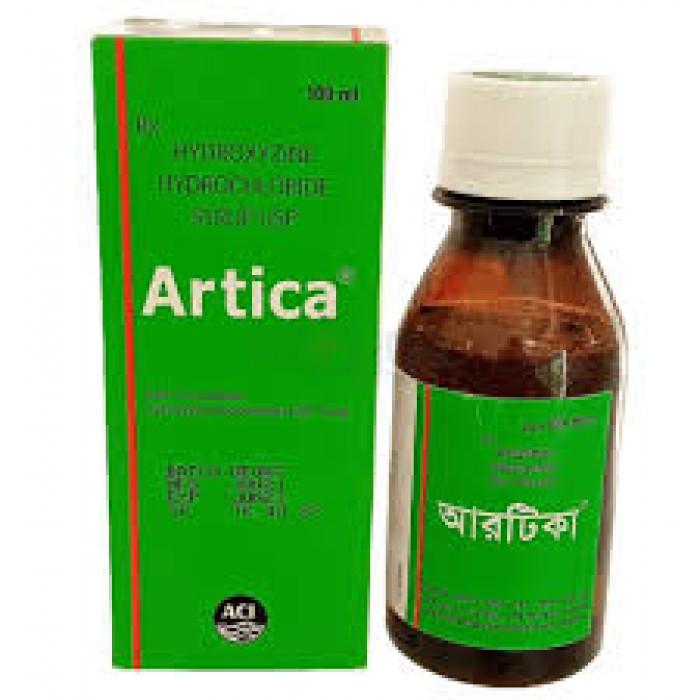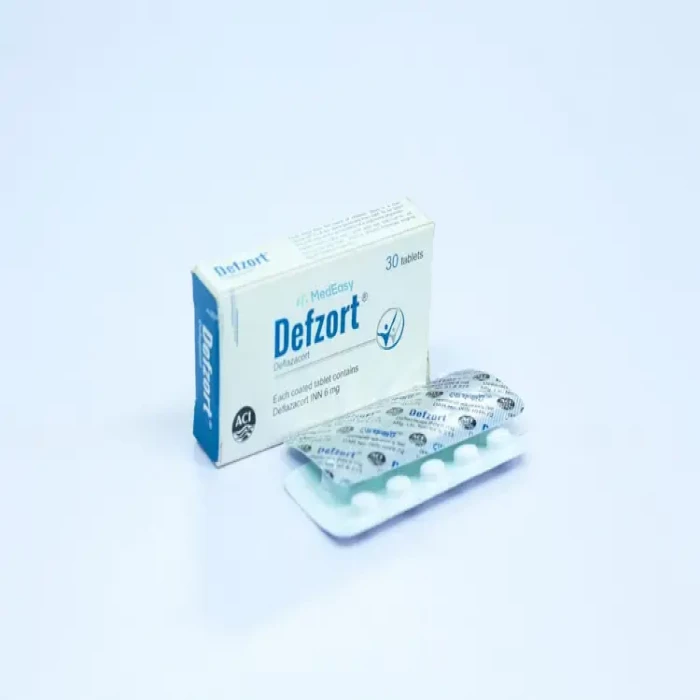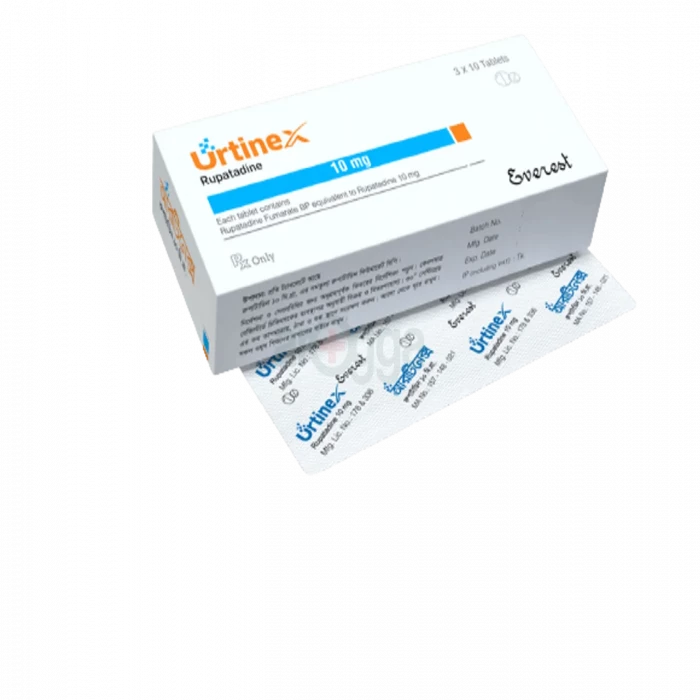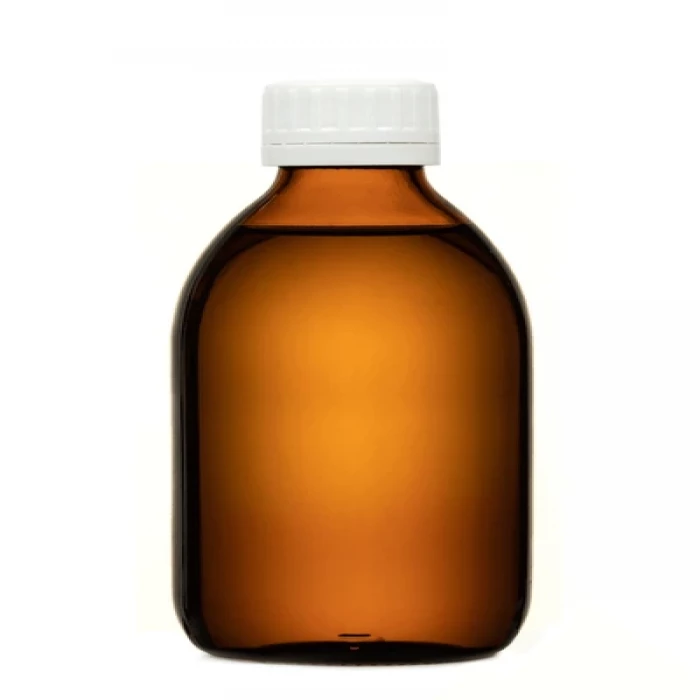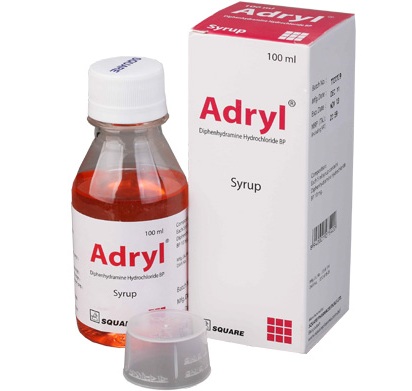
✔ 100% Authentic Product
👁️ Currently Viewing 2304
Adryl Syrup 100ml
Adryl Syrup is a combination medicine used to treat cough. It thins the mucus in the nose and windpipe, making it easier to cough out. It also relieves allergy symptoms like runny nose, stuffy nose, sneezing, watery eyes, and congestion or stuffiness.
Discount
Price: ৳ 42
MRP:
৳
45
6%
Off

100% Genuine Products, Guaranteed

Safe & Secure Payments, Always

Fast, Secure & Efficient Delivery

Proper Packaging
 Cash on Delivery - All over Bangladesh
Cash on Delivery - All over Bangladesh Regular Delivery - 12-24 Hours, Dhaka City* Charge Tk.39-59
Regular Delivery - 12-24 Hours, Dhaka City* Charge Tk.39-59 Regular Delivery - 24-48 Hours, Other Cities* Charge Tk.99-110
Regular Delivery - 24-48 Hours, Other Cities* Charge Tk.99-110
 ফ্রি ডেলিভারিঃ - ৯৯৯ টাকা+ অর্ডারে, ঢাকা
শহরে
ফ্রি ডেলিভারিঃ - ৯৯৯ টাকা+ অর্ডারে, ঢাকা
শহরে ফ্রি ডেলিভারিঃ - ২৯৯৯ টাকা+ অর্ডারে, ঢাকার
বাহিরে
ফ্রি ডেলিভারিঃ - ২৯৯৯ টাকা+ অর্ডারে, ঢাকার
বাহিরে
100% Genuine Products, Guaranteed
Safe & Secure Payments, Always
Fast, Secure & Efficient Delivery
Proper Packaging
 Cash on Delivery - All over Bangladesh
Cash on Delivery - All over Bangladesh Regular Delivery - 12-24 Hours, Dhaka City* Charge Tk.39-59
Regular Delivery - 12-24 Hours, Dhaka City* Charge Tk.39-59 Regular Delivery - 24-48 Hours, Other Cities* Charge Tk.99-110
Regular Delivery - 24-48 Hours, Other Cities* Charge Tk.99-110 ফ্রি ডেলিভারিঃ - ৯৯৯ টাকা+ অর্ডারে, ঢাকা
শহরে
ফ্রি ডেলিভারিঃ - ৯৯৯ টাকা+ অর্ডারে, ঢাকা
শহরে ফ্রি ডেলিভারিঃ - ২৯৯৯ টাকা+ অর্ডারে, ঢাকার
বাহিরে
ফ্রি ডেলিভারিঃ - ২৯৯৯ টাকা+ অর্ডারে, ঢাকার
বাহিরে
✅ Description:
Diphenhydramine Hydrochloride is the active ingredient in Adryl Syrup. Adryl Syrup is an antihistamine medication that is used to treat symptoms of nasal allergy such as sneezing, runny nose, itching, and watery eyes. It can also be used to treat insomnia and motion sickness.
It is important to take Adryl Syrup exactly as prescribed by your doctor. The dose and frequency of administration will depend on the condition being treated. It is typically recommended to take it before a meal or at bedtime.
Dizziness and drowsiness are common side effects of this medication.
Before taking Adryl Syrup, it is important to inform your doctor if you have glaucoma, gastrointestinal issues, or asthma. It is also necessary to inform your doctor if you are pregnant or breastfeeding.
Additionally, it is important to inform your doctor about all other medications you are taking, as some medications may interact with Adryl Syrupand affect its effectiveness or alter its mechanism of action. It is generally advised to avoid alcohol while taking this medication.
Safety Advices

Alcohol
UNSAFE
Avoid alcohol consumption while taking Adryl Syrup as it may lead to unwanted effects.

Pregnancy
CONSULT YOUR DOCTOR
Adryl Syrup is not recommended for use in pregnancy unless considered clearly necessary. Contact your doctor before taking it.

Breastfeeding
CONSULT YOUR DOCTOR
Adryl Syrup should be used with caution in breastfeeding women as it is not known whether it may pass through breast milk. Contact your doctor before taking it.

Driving
CAUTION
Do not drive or operate machines if you feel drowsy after taking Adryl Syrup

Kidney
CONSULT YOUR DOCTOR
Adryl Syrup is safe to use in patients with kidney disease. No dose adjustment of Adryl Syrup is recommended.
However, talk to your doctor if you have any underlying kidney disease.

Liver
CAUTION
Adryl Syrup should be used with caution in patients with liver dysfunction. Contact your doctor before taking it.
✔️ Uses of Adryl Syrup
Treatment of-
- Nasal allergy symptoms
- Cough
- Motion Sickness
✔️ Side Effects of Adryl Syrup
- Stomach pain/epigastric pain
- Sleepiness
- Dizziness
- Dry mouth
- Headache
- Nausea, vomiting
- Gastrointestinal discomfort
- Impaired coordination
- Thickened respiratory tract secretions
✔️ How does Adryl Syrup work?
Diphenhydramine is an antiallergic which relieves allergy symptoms like runny nose, watery eyes, and sneezing.
✔️ Quick Suggestions:
- To help alleviate congestion and soothe your throat, it is recommended to drink warm water while you are taking Adryl Syrup.
- Take Adryl Syrup exactly as directed by your doctor or as indicated on the label. Avoid increasing the dosage or taking it for a longer duration than recommended.
- When measuring the dosage, use a proper measuring cup or spoon to ensure accurate measurement.
- Most coughs typically resolve within 2 weeks. If your cough persists beyond this timeframe, it is advisable to consult your doctor for further evaluation.
- Inform your doctor if you have a history of stomach ulcers or asthma, as these conditions may require special consideration when using Adryl Syrup.
- It is important to inform your doctor about all the medications you are currently taking, including any antidepressants or other drugs, as there may be potential interactions between Adryl Syrup and other medications.
- Remember to follow your doctor's instructions and consult them if you have any concerns or questions regarding the use of Adryl Syrup.
✔️ Indication
Diphenhydramine Hydrochloride helps to treat-
- Vasomotor rhinitis can be seasonal or persistent.
- Urticaria, angioneurotic edema, and anaphylaxis are all symptoms of an allergic reaction.
- Pruritic symptoms
- Prescriptions for emesis and motion sickness are available.
- Meniere's disease and Parkinsonism are examples of miscellaneous conditions.
✔️ Pharmacology
Diphenhydramine is an antihistamine medication that exhibits sedative and anticholinergic properties. It works by binding to H1-receptor sites, competing with histamine. By blocking these receptors, diphenhydramine helps to alleviate allergic reactions and symptoms associated with histamine release, such as itching, sneezing, runny nose, and watery eyes. Its sedative properties make it useful for the temporary relief of occasional sleeplessness or insomnia. Additionally, its anticholinergic effects contribute to its ability to relieve symptoms like nausea, vomiting, and motion sickness.
✔️ Dosage & Administration of Adryl Syrup
Adult Dose:
- Allergic conditions; Treatment and prophylaxis of motion sickness: 25-50 mg taken orally 3-4 times daily. For prevention of motion sickness, take 30 minutes before exposure to motion. The maximum daily dose should not exceed 300 mg.
- Parkinson's disease: Initially, take 25 mg three times daily. The dosage may be increased to 50 mg four times daily if necessary.
- Short-term management of insomnia: Take 50 mg 30 minutes before bedtime as needed.
- Hepatic impairment: No dosage adjustment is needed for individuals with hepatic impairment.
Child Dose:
- Allergic Reaction:
- 2-6 years: Take 6.25 mg every 4-6 hours. The maximum daily dose should not exceed 37.5 mg.
- 6-12 years: Take 12.5-25 mg every 4-6 hours. The maximum daily dose should not exceed 150 mg.
12 years: Take 25-50 mg every 4-6 hours. The maximum daily dose should not exceed 300 mg.
- Occasional Insomnia:
12 years: Take 50 mg 30 minutes before bedtime.
- Cough:
- <12 years: Safety and efficacy have not been established.
12 years: Take 25-50 mg every 4-6 hours. The maximum daily dose should not exceed 300 mg.
- Motion Sickness: Administer 30 minutes before motion.
- 12.5-25 mg every 6-8 hours or 150 mg/m². The maximum daily dose should not exceed 300 mg.
Renal Dose:
- No dosage adjustment is needed for individuals with renal impairment.
Administration:
- Shake well before use. Your physician will decide the correct dose and duration for you depending on your age, body weight, and disease condition.
- Adryl Syrup may be taken with or without food.
✔️ Interaction
- Some medicines can affect the way Adryl Syrup works, or this medicine itself can reduce the effectiveness of other medicines taken at the same time.
- Tell your doctor about all the medicines, supplements, or herbals you are currently taking or might take to avoid any possible interaction
- Adryl Syrup should not be used concomitantly with MAO inhibitors like Selegiline and Isocarboxazid (used for psychiatric illness). It produces a condition called serotonin syndrome which is a life-threatening condition that can occur rapidly due to a build-up of an excessive amount of serotonin in the body. In serotonin syndrome, a person may experience high body temperature, high blood pressure, fast heart rate, excitability, tremor (shakiness), and sweating. In such a situation, patients should rush to a nearby hospital immediately.
- Concomitant use of this medicine with other anti-allergic medicines like Cetirizine, medicines like Atropine, Benztropine (used to treat travel or motion sickness, stomach cramps, and Parkinson’s disease), opioids like Codeine, Morphine (to relieve severe painful conditions), medicines like Propranolol, Metoprolol (used to treat heart problems, to decrease blood pressure) and may alter the effects of this medicine.
- Other medicines like Amitriptyline, Doxepin, and Ephedrine should be used with caution.
✔️ Contraindications
- If you are allergic to diphenhydramine, the ingredients of Adryl Syrup.
- If you are taking medicines like MAO inhibitors (Selegiline, Phenelzine, etc) which are used for psychiatric illness.
- If you have glaucoma (increased pressure in the eye which produces painful, red eyes and gradual vision loss).
- If you have ulcers in the stomach and intestine (symptoms like vomiting, acidity, indigestion, bleeding, black stool) or any problems related to your stomach.
- If you have prostate problems (conditions like benign prostatic hyperplasia which is characterized by difficulty in urination, frequent urge to go to urination, and dribbling of urine).
- If you have liver or kidney problems.
- If you have an asthma attack.
- If you are breastfeeding.
- If you are taking other sedating antihistamines medicines like Promethazine and Chlorpheniramine.
✔️ Pregnancy & Lactation
Category B: There are no appropriate and well-controlled studies of diphenhydramine hydrochloride in pregnant women. As a result, diphenhydramine hydrochloride should only be used during pregnancy if absolutely necessary. Diphenhydramine hydrochloride has been known to be excreted in breast milk, hence it is not recommended for use by nursing mothers.
✔️ Precautions & Warnings
Inform your doctor about your current medications, over-the-counter products (e.g., vitamins, herbal supplements, etc.), allergies, pre-existing diseases, and current health conditions before using Adryl Syrup (e.g. pregnancy, upcoming surgery, etc.). Some medical conditions may make you more susceptible to the drug's side effects. Take as directed by your doctor or as directed on the product insert. The dosage is determined by your medical condition. Inform your doctor if your condition worsens or persists. The following are important counseling points.
- 65 years old or older
- Asthma
- Breastfeeding
- Bronchitis is chronic
- Urination difficulties
- Emphysema
- Glaucoma
- Cardiovascular disease
- High Blood Pressure
- Lung cancer
✔️ Storage Conditions
Medicines should be stored at room temperature, away from heat and direct light. Unless otherwise specified in the package insert, do not freeze medications. Keep medicines out of the reach of children and pets.
⚠️Disclaimer:
At ePharma, we’re committed to providing accurate and accessible health information. However, all content is intended for informational purposes only and should not replace medical advice from a qualified physician. Please consult your healthcare provider for personalized guidance. We aim to support, not substitute, the doctor-patient relationship.





